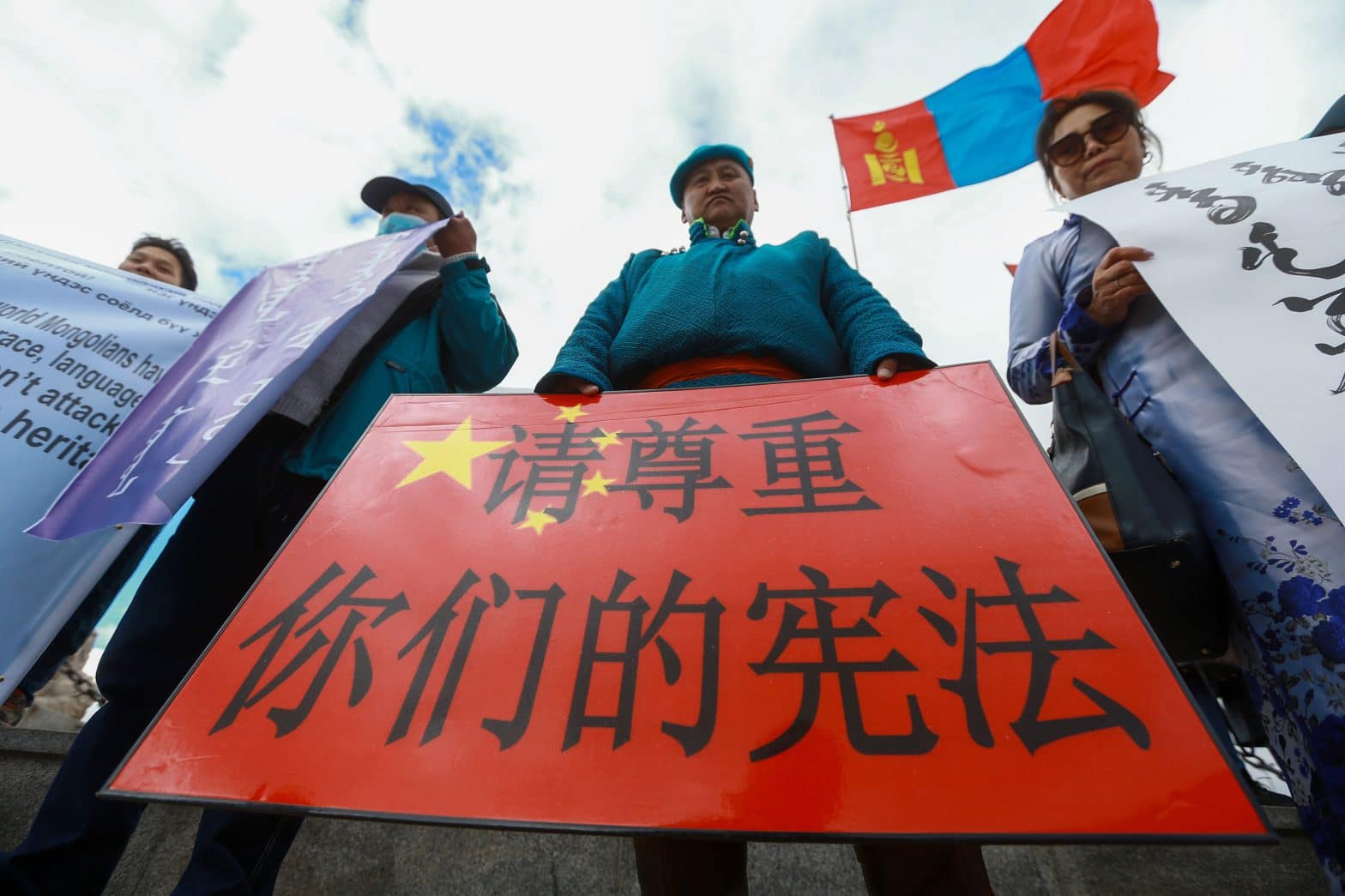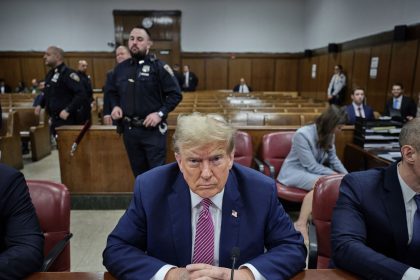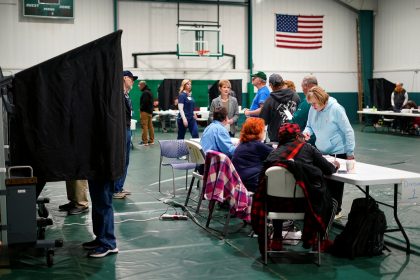Threats of Arrest, Job Loss and Surveillance. China Works to Erase Its ‘Model Minority’

BEIJING — The herder couldn’t speak for long. His phone was being monitored, he said, as are those of many other Mongols around him.
“We have no way out. There’s nothing we can do,” said Gangbater, a herder in Xilingol League, a central part of China’s Inner Mongolia autonomous region, where mass protests broke out three weeks ago when the government implemented a new “bilingual education” program to replace the Mongolian language with Chinese in half of Mongol school classes.
Demonstrations against the program appear to have been largely suppressed. More than 90% of children who had boycotted school in Xilingol were back in class — including his own, said Gangbater, who asked not to use his full name for fear of retribution from authorities.
“If you don’t send the kids (to school), they take away your jobs,” said Gangbater. “You can’t get subsidies or loans from the banks. They put you on a blacklist. They are arresting the people who signed petitions. They have all kinds of methods.”
The Chinese government’s crackdown on Inner Mongolia has been swift and unsurprising, using a familiar arsenal of tactics — surveillance, financial and occupational threats, detention, social credit blacklisting and media control — often deployed against ethnic minorities and others deemed a threat to “social stability.”
But it is remarkable for taking place in what has long been known as China’s “model minority” region. The backlash against the bilingual plan has raised criticism from Mongols within China and across the border in Mongolia, but it has also drawn a rare rebuke from Communist Party elite in Beijing.
The protests, however, have not deterred the government’s resolve to erode minority cultural identity. Last week, local authorities in the city of Xilinhot, the seat of government in XIlingol, announced via WeChat that parents who did not send their children to school by Sept. 17 would lose access to government subsidies. High schoolers who did not attend classes would be expelled and blocked from taking the college entrance exam. Banks would stop loans for the next five years to any parents who did not comply.
A separate government notice stated that parents who did not abide would be placed on an “untrustworthy persons list,” and face restrictions on jobs, special market transactions, cross-border travels, home reconstruction and other actions requiring good social credit standing.
Xilinhot authorities announced last week that they had successfully brought all 3,469 students in the area’s Mongolian-language schools back to class. “Chinese ethnicities as one close family, building the China dream with one heart,” declared bright white Chinese and Mongol letters against a red background on top of the announcement.
A police source within Inner Mongolia told the Los Angeles Times that most students had returned to school, but officers were tracking down people who had posted anything “harmful to the government” online. He shared images of police orders that included people’s names, identification numbers, phone numbers, addresses and workplaces, and required police to implement “education and stability control” on the individuals.
Several of the individuals were targeted for “stability control” because they’d called for protests or posted messages on WeChat about alleged Mongol suicides. The Southern Mongolia Human Rights Center, a New York-based rights group, said that nine Mongolians, mostly teachers and students, had committed suicide in recent weeks after coming under government pressure.
The Times was not able to reach families of the deceased, but reviewed two government documents acknowledging the suicides of a 17-year-old girl and a 33-year-old woman in early September. The government notices claimed the girl had jumped from the fourth floor of a school building after fighting with a classmate during a dance rehearsal, and that the woman had also jumped from a building after suffering depression.
The crackdown on Inner Mongolia is startling because Mongols have long been better integrated and more loyal to China than most other ethnic minorities, said a Mongol historian from Inner Mongolia who now lives abroad. She asked not to use her name to protect her family still within China.
The Inner Mongolia autonomous region was created in 1947 — two years before the People’s Republic of China was formed — and its leaders allied with Mao Zedong’s Communist Party, in part because Mao promised genuine autonomy for Inner Mongolia.
“They were convinced that the communist system would work for them,” the historian said. “They are resentful because they feel they have been betrayed.”
Inner Mongolia was the model for other minority autonomous regions, all of which have a right to self-governance, including in education, culture and language, according to the Chinese Constitution. But China’s constitutional guarantees for minority “autonomy” have never been fully upheld, according to Uradyn Bulag, an anthropologist at Cambridge University who is also from Inner Mongolia.
Within a few years of the PRC’s formation, large numbers of Han Chinese settlers moved into the region, soon outnumbering the Mongols. During the Cultural Revolution, calls for Inner Mongolian autonomy prompted Chinese officials to accuse Mongols of separatism — ultimately killing more than 20,000 Mongols, according to official numbers, in a purge against a so-called secret party that the Communist Party later acknowledged did not exist.
Despite such traumas, many Inner Mongolians, more so than ethnic Uighurs or Tibetans, have embraced integration into Chinese society and willingly sent their children to Chinese-language schools in hopes of securing better economic opportunities.
Yet anxiety over losing their mother tongue is deep despite government assurances that some classes will still be taught in Mongolian. Past promises from the Chinese government have proved hollow.
“They have a way of saying, ‘Nothing’s changing,’ but in reality you know things are changing,” said James Leibold, a specialist on Chinese ethnic policy at La Trobe University in Australia.
The new regulations in Inner Mongolia are part of a broader change in ethnic policy that started in academic discussions a decade ago and gained momentum after a 2014 speech by China’s president, Xi Jinping, Leibold said. The speech called for a “new stage” of ethnic work, with accelerated employment and education policies, interethnic “mingling,” and building a “shared consciousness of the Chinese nation.”
The constitution has not changed. But in practice, China’s policies have abandoned the original promises of autonomy and moved toward assimilation by force. The Chinese state frames this move as a “civilizing” drive, Leibold said, in which minorities assumed to be “backward” are molded into supposedly superior Han Chinese ways of life.
The shift has drawn attention from Mongolians across the border in Mongolia, where protesters gathered in the capital city of Ulaanbaatar’s main square wearing traditional tunics and shouting, “Protect the mother tongue,” as Chinese Foreign Minister Wang Yi visited last week.
“You cannot separate a person’s language and culture from the person,” said Tsakhiagiin Elbegdorg, the former president of Mongolia. “This is a widely discussed issue, widely supported by Mongolians. … If someone hurts in Inner Mongolia, we feel it in Mongolia in the same way.”
Wang told Mongolian media last week that Elbegdorg was “two-faced” for speaking in support of Inner Mongolian protesters, using a term authorities deployed in Xinjiang, a region in northwest China, against Uighur intellectuals detained in camps on suspicion of being disloyal to China.
Meanwhile in Beijing, Ma Xiaoli, an elite party member whose father was close to Xi’s father, spearheaded a public letter protesting the Inner Mongolia crackdown. It called for a retraction of the order, an apology to Mongols, an end to coercive methods and arbitrary arrests and no labeling of protesters as “political criminals” or tools of “foreign anti-China forces.”
The letter was signed by 18 former “sent-down youth” who’d spent years laboring in Inner Mongolia during the Cultural Revolution when urban young people were sent to rural regions. They’d witnessed how Inner Mongolians suffered in that era, yet remained loyal to China afterward, they said.
“Most Mongol comrades are patriotic, law-abiding citizens. … Loving the country and loving one’s ethnic group are not in conflict,” the letter said. “We are deeply concerned that if this situation continues, a peaceful Inner Mongolia will be turned into a second Xinjiang! How that would pain the heart!”
Ma could not be reached for comment, but a source directly acquainted with several of the letter’s signatories confirmed its authenticity to The Times.
Despite the extraordinary resistance, there are no signs that the language policy or China’s broader shift in ethnic policy are going to change. Last week, China’s state council released a white paper on what rights groups have called forced labor in Xinjiang, stating that about 1.29 million mostly ethnic Uighur workers had gone through “vocational training” annually from 2014 to 2019 and that this had “improved the people’s material and cultural lives.”
Chinese authorities have continued to block foreign journalists from reporting in Inner Mongolia, harassing, following and pressuring them into leaving the region.
On Tuesday, authorities sentenced real estate tycoon Ren Zhiqiang, an elite party insider who criticized Xi’s handling of the coronavirus pandemic, to 18 years in prison — sending a signal that even the party’s “princeling” elites are not safe from punishment.
The police source in Inner Mongolia said he was “on the edge of breakdown.” He knew a musician who had been detained and a friend working at a TV station who had been forced to write a self-criticism under threat of losing her job. A classmate of his and that classmate’s father were under 24-hour surveillance.
He feared for his own safety, he said, but had no way out.
———
©2020 Los Angeles Times
Distributed by Tribune Content Agency, LLC.
























